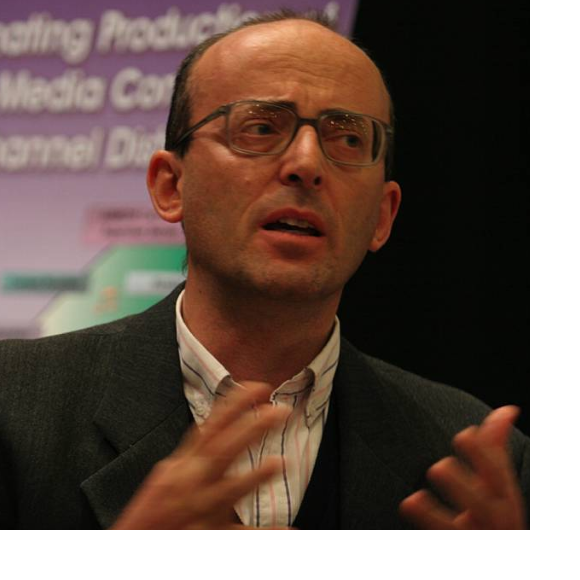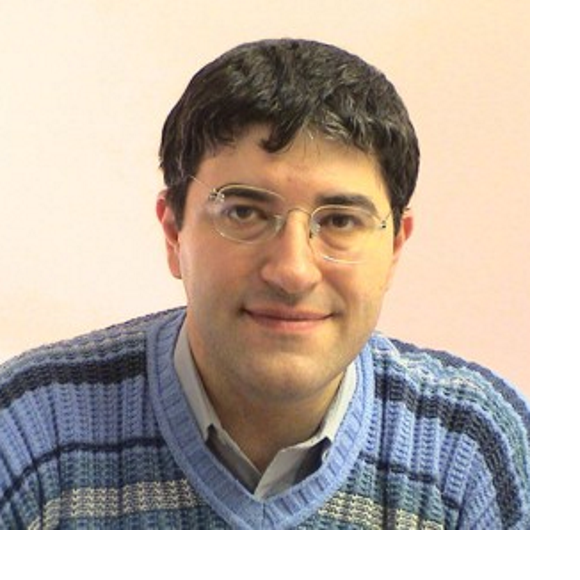Daniel Gatica-Perez
 Crowdsourcing the Campus, the City, and Beyond
Crowdsourcing the Campus, the City, and Beyond
"The space of our life is neither continuous nor infinite, homogeneous, isotropic.
But do we precisely know where it breaks, where it curves, where it disconnects, and where it reassembles?" From this question in Georges Perec's
Species of Spaces classic essay, I will discuss my group's recent research on mobile crowdsourcing, which integrates youth participation, smartphone
sensing, machine learning of mobile sensor and media, and inference of properties of human spaces and everyday life patterns. We aim to deepen our
understanding of how mobile and social technology can support communities and other stakeholders engaged in their own spaces for the common good.
Prof. Daniel Gatica-Perez directs the Social Computing Group at Idiap and EPFL in Switzerland, affiliated with the School of
Engineering and the College of Humanities. His research integrates theories and methods from ubiquitous computing, social media, machine learning,
and social sciences to understand human and social behavior in everyday life for social good applications. His current work includes mobile crowdsensing
in cities; large-scale analysis of mobile social media, smartphone data, and open data; and analysis of face-to-face and online conversational behavior.
His research has been supported by the Swiss National Science Foundation, the Swiss Commission for Technology and Innovation, the European Commission, and
several industry partners. He also works with cities and local organizations in social innovation projects.
Beatrice de Gelder
 Why and how a model driven feature analysis of dance movements can help to understand
Why and how a model driven feature analysis of dance movements can help to understand
Social species spend considerable time observing the body movements of others to
understand their actions, predict their emotions, watch their games and last but not least,
to enjoy their dance movements. Given the important information obtained from body
movements we still know surprisingly little about the detailed brain mechanisms
underlying movement perception in naturalistic videos. Previous studies have mainly
focused on analysis of subjective experience and on diverse means of quantifying it.
While such studies have revealed details about the role of subjective experience they
have provided limited understanding about the perceptual basis of movement and dance
perception. In this talk we turn to the few studies in the literature that have gone beyond
the use of semantic categories to look into how the brain represents underlying movement
features and builds up a representation of dance qualities. We will specifically explore
how a computational model driven analysis throws new light on the brain basis of
movement and dance perception.
Beatrice de Gelder is Professor of Cognitive Neuroscience in the Faculty of Psychology and Neuroscience at Maastricht University in Maastricht,
The Netherlands, and a member of the Maastricht Brain Imaging Centre (M-BIC). Prior to her current assignments, she was a Senior Scientist at the Martinos
Center for Biomedical Imaging, Harvard University. She received an MA in Philosophy, an MA in Experimental Psychology and a PhD in Philosophy from Louvain
University in Belgium. Her current research focuses on face and body recognition and, recently, on the neuroscience of art. She has received various research
grants and in 2012 was awarded a European Research Council (ERC) scientific grant for the study of body language and emotional body expression.
Her research has resulted in over 220 peer-reviewed articles and 22 invited chapters in professional books. Scientific American published an invited article
expanding on the broad impact of her work on unconscious vision (2010, updated in 2017) and in July 2011, Discovery Science broadcast an episode covering
her work as part of the US science program “Through the Wormhole.” She has authored or co-authored three professional books covering her work. Her book on
“Emotions and the Body” was recently been published by Oxford University Press (2016). She serves on the editorial board of several professional journals
and is currently Editor in Chief of Frontiers in Emotion Science. She is/has been a member of several advisory panels of the European Commission for FET,
ICT programs of FP6, FP7, ESF and ERC and outside EU, of NIH and NSF. Extensive documentation of her work can be found at www.beatricedegelder.com.
Antonio Camurri, Gualtiero Volpe and InfoMus - CasaPaganini

 Retrospective on 20 years of EyesWeb
Retrospective on 20 years of EyesWeb
Antonio Camurri and Gualtiero Volpe with the participation of Nicola Bernardini, Alvise Vidolin and the members of InfoMus - CasaPaganini will present the story of the EyesWeb platform,
its origins, the ideas behind it, the journey that brought this multimodal platform to current time and beyond with plans for the future and new projects. The Keynote will be enriched by the
participation of artists and developers that used the platform during the past years in their applications, performances and shows. The event will end with the performance “Europa: Gesture of
History - Dancing Science and Art not to forget EU identity” excerpt from the scientific performance commissioned by EU DG Connect in occasion of the celebration of the Treaty of Rome.
A project of Casa Paganini-InfoMus in collaboration with Virgilio Sieni dance company and Andrea Cera
Prof. Antonio Camurri is full professor at DIBRIS - University of Genova (Polytechnic School), where he teaches "Human Computer Interaction"
and "Multimodal Systems" (Master Degree on Computer Engineering). His research interests include multimodal interfaces, computational models of non-verbal expressive gesture,
emotion and KANSEI information processing, non-verbal social behavior, sound and music computing, multimodal interactive systems for theatre, music, dance, museums, and for
therapy and rehabilitation. Founder and scientific director of InfoMus Lab and of Casa Paganini - InfoMus Research Centre of University of Genoa (www.casapaganini.org) ,
he coordinates and is local project manager of several European Projects in FP5 IST, FP6, CRAFT, FP7 ICT, Culture 2007. Owner of patents on software and multimedia systems,
he is responsible for University of Genoa of industry contracts. With collegues at InfoMus Lab, he conceived and designed the EyesWeb research project and
software platform .
Prof. Gualtiero Volpe Is an Associate Professor at DIBRIS, University of Genoa where he teaches "Informatics" (Bachelor Degree on Computer Engineering) and "Multimodal Systems" (Master Degree on Computer Engineering). His research interests include intelligent and affective human-machine interaction,
social signal processing, sound and music computing, modeling and real-time analysis and synthesis of expressive content, and multimodal interactive systems. He participated to national and European research projects on
interactive multimedia systems and multimodal interfaces at the InfoMus Lab. He praticipated and coordinated several EU projects in IST, FP6, FP7 and H2020 programs.
He participated to the design of both the scientific and technical aspects of several interactive installations by the InfoMus Lab.
 Crowdsourcing the Campus, the City, and Beyond
Crowdsourcing the Campus, the City, and Beyond Why and how a model driven feature analysis of dance movements can help to understand
Why and how a model driven feature analysis of dance movements can help to understand
 Retrospective on 20 years of EyesWeb
Retrospective on 20 years of EyesWeb